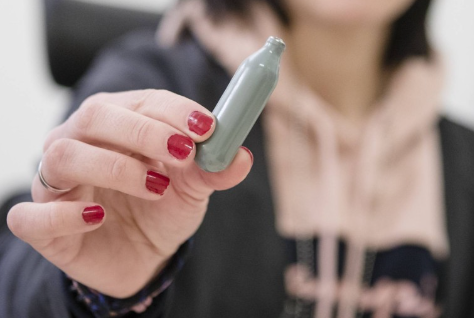Inledning
Lustgas patroner har blivit allt mer populära som ett enkelt och säkert sätt att använda lustgas i olika sammanhang. Med sin kompakta design och mångsidighet erbjuder dessa patroner en bekväm lösning för att tillhandahålla lustgas för både medicinska ändamål och kulinariska äventyr. Från smärtlindring inom medicinen till att skapa läckra skumma gräddedesserter i köket har lustgas patroner blivit oumbärliga verktyg. I denna artikel kommer vi att utforska fördelarna med att använda lustgas patroner, dess användningsområden och de säkerhetsaspekter som bör beaktas för en trygg och effektiv användning.

Vad är lustgas?
Lustgas, även kallad kväveoxid eller N2O, är en gas som vanligtvis används för medicinska ändamål. Den består av kväve och syre och har en sötaktig smak och lukt. Lustgas finns vanligtvis i gastuber och används i olika sammanhang på grund av dess mångsidighet.
- Användning: Lustgas används främst inom medicin för att ge smärtlindring under procedurer som tandbehandlingar eller förlossningar. Dess snabba verkan och förmåga att minska ångest gör det populärt inom dessa områden.
- Historia: Lustgas upptäcktes redan på 1700-talet av den brittiske kemisten Joseph Priestley. Sedan dess har dess användning utvecklats och spridits till olika områden, inklusive underhållningsbranschen där det ibland används som ett berusningsmedel.
Genom åren har lustgas blivit en viktig komponent inom hälso- och sjukvården samt andra branscher på grund av dess effektivitet och säkerhet vid rätt hantering.
Så fungerar lustgas patroner
Lustgas patroner är små cylindriska behållare fyllda med lustgas, även känd som kväveoxid. Dessa patroner är vanligtvis tillverkade av metall och har en liten ventil för att reglera gasflödet.
För att aktivera en lustgaspatron, placeras den i en speciell behållare eller dispenser. Genom att öppna ventilen frigörs lustgasen, vilket skapar ett tryck som driver gasen genom systemet och gör den användbar för olika ändamål.
En av de främsta anledningarna till varför lustgas patroner är populära är deras mångsidighet. Dessa patroner används inte bara inom medicinska sammanhang för smärtlindring under förlossningar eller tandvårdsbehandlingar utan också inom livsmedels- och dryckesindustrin.
Inom matlagning används lustgas patroner för att skapa krämiga såser eller mousses genom att vispa grädde eller andra ingredienser tillsammans med gasen. Detta resulterar i en snabb och effektiv process för att skapa läckra rätter och desserter.
Med sin enkla design och effektiva användningsområden har lustgas patroner blivit ett oumbärligt verktyg i många branscher, där snabbhet och kvalitet är avgörande faktorer för framgång.
Riskerna med att använda lustgas patroner för berusning
Att använda lustgas för berusning kan ha allvarliga hälsorisker som inte bör underskattas. Inandning av lustgas kan leda till syrebrist i kroppen, vilket kan resultera i yrsel, svimning och i extrema fall även syrebrist till hjärnan.
Omedelbara effekter av att inandas lustgas inkluderar snabb inledande rusighet, följt av en känsla av eufori och viktlöshet. Dessa effekter, även om de initialt kan verka lockande, kan snabbt övergå till illamående, huvudvärk och förvirring.
Missbruk av lustgas kan vara farligt på grund av dess potentiella negativa konsekvenser på lång sikt. Regelbunden och överdriven användning kan leda till nervskador och minnesskador. Dessutom kan det vara beroendeframkallande, vilket ökar risken för att utveckla ett beroende av ämnet.
För dem som använder lustgas som drivmedel för berusning är det viktigt att vara medveten om dessa risker och överväga alternativa sätt att ha roligt utan att äventyra sin hälsa.

Annat viktigt jag bör känna till?
Lustgas patroner är lagliga att köpa och använda för matlagning eller medicinska ändamål, men det är olagligt att använda dem för rekreationellt bruk. Det är viktigt att respektera dessa lagar för att undvika juridiska konsekvenser.
För säker hantering och förvaring av lustgas patroner, se till att de förvaras på en sval och torr plats utom räckhåll för barn. Undvik att utsätta patronerna för höga temperaturer eller direkt solljus för att minimera risken för oavsiktlig skada.
Om du upplever problem relaterade till lustgasanvändning, tveka inte att söka hjälp. Kontakta din lokala vårdcentral eller beroendecenter för stöd och rådgivning. Det är viktigt att ta tag i eventuella problem tidigt för att undvika allvarliga konsekvenser på lång sikt.
Genom att följa lagar och regler kring lustgas patroner samt genom säker hantering och medvetenhet om var man kan få hjälp vid behov, kan du säkerställa en tryggare användning av denna produkt.
Nackdelar med att använda lustgas patroner
Att använda lustgas patroner kan ha negativa konsekvenser om det sker regelbundet. Överkonsumtion av lustgas patroner kan leda till allvarliga hälsoproblem såsom syrebrist och i värsta fall permanenta skador på nervsystemet. Det är därför viktigt att vara medveten om riskerna och inte överskrida rekommenderade doser.
Miljöpåverkan av att slänga använda lustgas patroner är också betydande. Då dessa patroner ofta innehåller metalliskt material som aluminium, kan de utgöra en miljörisk om de inte tas om hand på rätt sätt. Slängda patroner kan hamna i naturen och skada djurlivet samt förorena mark och vatten.
Överkonsumtion av lustgas patroner kan vara skadligt för både individen och samhället i stort. Förutom de direkta hälsoriskerna kan överdriven användning leda till missbruk och beroende, vilket i sin tur kan påverka både den fysiska och psykiska hälsan negativt. Det är därför avgörande att använda sådana produkter med måtta och medvetenhet om dess potentiella konsekvenser.
6. Akuta risker vid inandning
Att andas in lustgas i höga doser kan medföra omedelbara hälsorisker och allvarliga konsekvenser. Symtom på lustgasförgiftning kan vara snabbt stigande och kräver snabb hantering för att undvika allvarliga skador.
- Effekterna av höga doser lustgas inkluderar yrsel, förvirring och till och med medvetslöshet.
- Patienter som exponeras för höga halter av lustgas riskerar syrebrist, vilket kan leda till syrebristrelaterade komplikationer.
Vid akut exponering för lustgas är det viktigt att agera snabbt och korrekt för att minimera skadorna. Här är några råd om hur man bör agera:
- Om någon visar symtom på lustgasförgiftning, flytta personen till frisk luft omedelbart.
- Kontakta sjukvårdspersonal eller ring nödnumret om symtomen försämras eller inte avtar.
- Ge inte syre om det inte finns en medicinsk bedömning som stöder detta, eftersom det kan öka risken för syrebrist i kroppen (hypoxi).
Att vara medveten om de akuta riskerna med inandning av lustgas är avgörande för att säkerställa en säker användning av ämnet och undvika potentiellt farliga situationer.
7. Långvarig användning kan leda till kroniska skador
Regelbunden användning av lustgas kan resultera i allvarliga hälsorisker på lång sikt. En av de mest betydande riskerna är potentialen för att utveckla nervskador, vilket kan vara permanent och svårt att behandla. Kroniskt bruk av lustgas kan också leda till brist på viktiga näringsämnen som vitamin B12, vilket i sin tur kan orsaka allvarliga hälsoproblem.
Lustgas, när det används frekvent och över en längre tid, har visat sig kunna skada nervsystemet på ett sätt som är svårt att reversera. Detta kan manifestera sig som domningar, stickningar eller förlamning i olika delar av kroppen, vilket starkt påverkar livskvaliteten för individen.
Förutom nervskador kan långvarigt bruk av lustgas resultera i andra allvarliga konsekvenser såsom minnesskador och kognitiva problem. Dessa effekter kan vara invaliderande och ha en betydande inverkan på individens dagliga livsfunktioner.
Det är avgörande att vara medveten om riskerna med långvarig lustgasanvändning för att undvika potentiella kroniska skador och negativa hälsoeffekter. Att söka professionell hjälp och rådgivning vid behov samt att regelbundet överväga användningsmönster och eventuella biverkningar är nödvändigt för att skydda både fysisk och mental hälsa.

8. Lustgas kan vara beroendeframkallande
Lustgas, även känd som lustgaspatroner, är en gas som används för berusningssyfte och i medicinskt syfte för smärtlindring. Trots att det främst används inom sjukvården och tandvården, har det också blivit populärt för sitt rusgivande syfte utanför dessa områden. Försäljningen av lustgaspatroner har ökat markant de senaste åren, vilket har lett till tusentals sålda tuber för icke-medicinskt bruk.
Vissa individer kan utveckla ett beroende av lustgas på grund av dess snabba och intensiva effekter. Detta beror främst på den euforiska känslan och den kortvariga lättnad den ger från stress eller smärta. Personer med tidigare missbruksproblem eller mentala hälsoproblem löper större risk att utveckla ett beroende av lustgas.
Det finns flera beteenden som kan indikera ett beroende av lustgas, inklusive ökad konsumtion över tid, toleransutveckling där högre doser krävs för samma effekt, samt att personen prioriterar användningen av lustgas framför andra aktiviteter. Att söka kontinuerlig tillgång till lustgas och uppleva abstinenssymtom när man inte använder drogen är också tecken på ett potentiellt beroende.
Lustgas patroner – hur tillverkar man dem och vad använder man de till?
Lustgas patroner är små cylindriska behållare fyllda med lustgas (kväveoxid) som man använder för olika ändamål. Tillverkningsprocessen för lustgas patroner är noggrant kontrollerad för att säkerställa hög kvalitet och säkerhet. Först fyller man patronerna med renad lustgas under tryck, sedan förseglas de för att förhindra läckage.
Användningsområdena för lustgas patroner sträcker sig från medicinska ändamål som smärtlindring vid tandläkarbesök till kulinariska äventyr inom matlagning där man använder de för att skumma grädde eller tillaga mousses. Dessutom är lustgas patroner populära inom motorsport och livsmedelsindustrin för att öka prestanda och konsistens i olika processer.
Lustgas patroner är en vanlig produkt på marknaden på grund av deras mångsidighet och effektivitet. Deras kompakta storlek gör dem lätta att hantera och transportera, vilket gör dem idealiska för både professionellt bruk och hemmabruk. Dessutom erbjuder de en snabb och bekväm lösning för att tillföra lustgas i olika sammanhang utan krångel.
Använd lustgas patroner för att göra vispad grädde
Lustgas patroner är ett oumbärligt verktyg för att skapa läckert vispad grädde på nolltid. Genom att använda en sifon tillsammans med dessa patroner kan du uppnå perfekt fluffig grädde med minimal ansträngning.
Enkel användning:
- Fyll sifonen med kall grädde.
- Skruva på en lustgaspatron och skaka väl.
- Resultatet? Krämig, luftig grädde redo att toppa dina favoriträtter.
Fördelar med lustgas patroner:
- Snabbhet: Vispa grädden på några sekunder.
- Konsistens: Den resulterande grädden är jämn och krämig.
- Bevarad fräschhet: Lustgasen hjälper till att behålla gräddens färskhet längre.
Receptförslag:
- Chokladmousse: Blanda smält choklad med vispad grädde för en silkeslen mousse.
- Fruktiga desserter: Toppa din favoritfrukt med vispad grädde för en läcker touch.
- Kaffedrycker: Skapa snabbt och enkelt krämiga kaffedrycker genom att blanda kaffe med vispad grädde.
Genom att inkludera lustgas patroner i ditt kök kan du lyfta dina matlagningsexperiment till nya höjder, oavsett om det gäller desserter eller huvudrätter.
Fördelar med att använda lustgas patroner
Att använda lustgas patroner erbjuder flera fördelar i olika situationer. Enkelhet är en av de främsta fördelarna, då dessa patroner är lätta att hantera och kräver minimalt underhåll.
Praktiskt i mobila inställningar: Lustgas patroner är idealiska för evenemang eller platser där mobilitet är viktigt, såsom festivaler eller utomhusaktiviteter.
Snabb verkan: En annan fördel är den snabba effekten av lustgasen när den används korrekt, vilket gör den lämplig för akuta medicinska ingrepp eller smärtlindring.
Ekonomiskt: Lustgas patroner kan också vara ett kostnadseffektivt alternativ för vissa ändamål jämfört med andra medicinska eller underhållande alternativ.
I sjukvårdsinställningar kan lustgas patroner vara till nytta vid smärtlindring under förlossning eller mindre kirurgiska ingrepp. Vid evenemang och fester kan de ge en rolig och snabb upplevelse för deltagarna. För matlagning och dryckestillredning kan de användas för att skapa spännande rök- eller skumeffekter.
I sammanfattning ger lustgas patroner en praktisk, snabb och ekonomisk lösning för olika ändamål, vilket gör dem mångsidiga och populära i olika branscher och sammanhang.
Kontakta Giftinformationscentralen vid frågor eller bekymmer
Giftinformationscentralen är en viktig resurs för att få svar på frågor och stöd när det gäller användning av lustgas. Att kontakta Giftinformationscentralen kan vara avgörande om du upplever problem med lustgasanvändning.
- Vid eventuella bekymmer med lustgas är det viktigt att söka hjälp och rådgivning från experter på Giftinformationscentralen.
- Giftinformationscentralen erbjuder professionellt stöd och vägledning för att hantera situationer som involverar lustgas.
- De olika typer av support och rådgivning som en kan erbjuda inkluderar information om risker, symtom på överdosering samt råd om hur man säkert hanterar situationen.
Att ha tillgång till denna typ av specialiserad support kan vara avgörande för att säkerställa hälsosam användning av lustgas. Genom att kontakta Giftinformationscentralen får du snabbt tillgång till kvalificerad hjälp och vägledning.
Avslutande kommentarer
Nu har du fått en översikt över vad lustgas är, hur patronerna fungerar, riskerna med att använda dem för berusning, och andra viktiga aspekter att tänka på. Kom ihåg att akuta risker vid inandning, långvarig användning och risken för beroende är allvarliga konsekvenser att vara medveten om. Även om det finns fördelar med att använda lustgas patroner, som att göra vispad grädde, är det viktigt att vara medveten om nackdelarna och riskerna.
För ytterligare frågor eller bekymmer kring lustgas patroner rekommenderar de att du kontaktar Giftinformationscentralen för råd och vägledning. Tänk på din säkerhet och välbefinnande när du överväger användningen av lustgas patroner.
Vanliga frågor
Vad är lustgas och hur använder man det?
Lustgas är en gas som man använder för medicinska ändamål som smärtlindring eller narkos. Det kan också missbrukas för dess berusande effekter genom inandning från patroner med hjälp av en sifon.
Är användning av lustgas patroner farligt?
Ja, det finns risker med att använda lustgas patroner för berusning. Akuta risker inkluderar syrebrist, medvetslöshet och kvävning. Långvarig användning kan leda till allvarliga hälsoproblem och beroende.
Kan jag använda lustgas patroner för matlagning?
Lustgas patroner kan man använda för att göra vispad grädde eller andra kulinariska ändamål. Det är viktigt att följa säkerhetsanvisningar och inte andas in gasen direkt från patronen.
Hur kan jag kontakta Giftinformationscentralen angående lustgas?
Om du har frågor eller bekymmer om lustgas, inklusive dess användning och eventuella följder, kontakta Giftinformationscentralen för råd och vägledning. De kan ge dig korrekt information baserad på din situation.
Vilka återförsäljare erbjuder lustgas patroner?
För att köpa lustgas patroner för matlagning eller annat bruk, kontakta specialiserade butiker eller online-återförsäljare som säljer tillbehör för matlagning eller bakning. Till exempel Gaskungen.nu Se till att följa lagar och regler kring köp och användning av sådana produkter.

Återförsäljning av lustgas
Lustgaspatroner är eftertraktade för återförsäljning på grund av deras mångsidighet och popularitet.
- Hög efterfrågan: Lustgas använder man i en mängd olika branscher, inklusive mat- och dryckesindustrin, medicinsk vård och motorsport, vilket skapar en konstant hög efterfrågan på patronerna.
- Lång hållbarhet: Lustgaspatroner har en lång hållbarhetstid vilket gör dem till en kostnadseffektiv produkt att lagra och sälja över tid.
- Små och lätta: Med sin kompakta storlek är lustgaspatroner lätta att hantera och transportera, vilket underlättar både förvaring och leverans.
- Breda kunder: Från restauranger som använder lustgas till matlagning eller skumma grädde till motorsportevenemang där man använder det för att öka motoreffekten, finns det många kunder som skapar många försäljningsmöjligheter.
- Konkurrenskraftig prissättning: Med relativt låga inköpskostnader och goda marginaler kan återförsäljning av lustgaspatroner vara lönsam för företagare.
Genom att erbjuda lustgaspatroner för återförsäljning kan företag dra nytta av den ständiga efterfrågan, långa hållbarheten, kompakta storleken, breda kundbasen och konkurrenskraftiga prissättningen för att maximera sin vinstpotential på marknaden.
Sammanfattning
Sammanfattningsvis har lustgas, även känd som kväveoxid eller N2O, en mängd olika användningsområden och tillämpningar. Den använder man främst inom medicinen för smärtlindring och narkos under olika procedurer. Lustgaspatroner, som är små cylindriska behållare fyllda med lustgas, använder man för att leverera gasen till olika ändamål, inklusive matlagning och berusning. Trots sina fördelar finns det risker med att använda lustgas, särskilt för berusning, inklusive akuta hälsorisker som syrebrist och långsiktiga konsekvenser som nervskador och beroende. För säker användning är det viktigt att följa rekommendationer och söka hjälp vid behov, t.ex. genom att kontakta Giftinformationscentralen. Trots dess popularitet för återförsäljning bör användare vara medvetna om lagar och regler som styr köp och användning av lustgas patroner.
